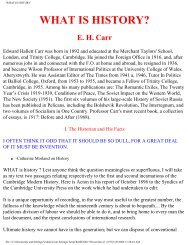The bronze age and the Celtic world - Universal History Library
The bronze age and the Celtic world - Universal History Library
The bronze age and the Celtic world - Universal History Library
Create successful ePaper yourself
Turn your PDF publications into a flip-book with our unique Google optimized e-Paper software.
THE WANDERINGS OF THE WIROS i6i<br />
Dodona. <strong>The</strong>se were <strong>the</strong> " Achaean " heroes, who seem to have made <strong>the</strong>mselves<br />
masters of <strong>the</strong> Mycenean city states, groaning under <strong>the</strong> rule of Minoan t5n-ants. A<br />
generation later <strong>the</strong>se joined o<strong>the</strong>rs in attacking Egypt, <strong>and</strong> it was <strong>the</strong>ir gr<strong>and</strong>sons who,<br />
under <strong>the</strong> leadership of <strong>the</strong> king of men, sacked <strong>the</strong> city of Priam.<br />
<strong>The</strong> next movement came from <strong>the</strong> <strong>Celtic</strong> mountain zone. It was between 1200<br />
<strong>and</strong> 1175 B.C. that <strong>the</strong> <strong>Celtic</strong> lords, accompanied by <strong>the</strong> bravest of <strong>the</strong>ir henchmen,<br />
left <strong>the</strong> <strong>Celtic</strong> cradle, crossed <strong>the</strong> Rhine, <strong>and</strong> passed through <strong>the</strong> BeUort gap into Gaul.<br />
By degrees <strong>the</strong>y conquered <strong>the</strong> whole of <strong>the</strong> country, though <strong>the</strong>y made <strong>the</strong>ir mark<br />
less in Aquitaine <strong>and</strong> Brittany. O<strong>the</strong>rs, passing in all probability down <strong>the</strong> Rhine,<br />
l<strong>and</strong>ed on <strong>the</strong> east coast of Great Britain, <strong>and</strong> settled in <strong>the</strong> eastern counties <strong>and</strong> in Wessex.<br />
It is too soon, as yet, to define <strong>the</strong> area which <strong>the</strong>y occupied, but <strong>the</strong> available evidence,<br />
derived from <strong>the</strong> swords <strong>and</strong> <strong>the</strong> finger-tip ware, suggests <strong>the</strong> region south-east of <strong>the</strong><br />
chalk scarp. Later on a few of <strong>the</strong>se passed across <strong>the</strong> densely-wooded Midl<strong>and</strong> plain,<br />
across Wales by <strong>the</strong> upper Severn valley <strong>and</strong> <strong>the</strong> Bala cleft, <strong>and</strong> reached <strong>the</strong> gold fields<br />
of Irel<strong>and</strong>. It was some Uttle time, however, before <strong>the</strong>y settled in any numbers in <strong>the</strong><br />
l<strong>and</strong> which still preserves <strong>the</strong>ir langu<strong>age</strong>.<br />
This seems to be all that we can as yet restore of <strong>the</strong> movements of <strong>the</strong> Q Wiros,<br />
though <strong>the</strong>re is a sequel to be added later ; we must turn now to <strong>the</strong> problem of <strong>the</strong><br />
P speaking people. We have seen that about <strong>the</strong> time that <strong>the</strong> Celts were leaving <strong>the</strong><br />
mountain zone for <strong>the</strong> west, b<strong>and</strong>s of Wiros from <strong>the</strong> plain, passing through <strong>the</strong> Moravian<br />
gate, across GaUcia <strong>and</strong> PodoUa, reached <strong>the</strong> rich valley of <strong>the</strong> Koban to <strong>the</strong> north of <strong>the</strong><br />
Caucasus mountains. Here <strong>the</strong>y learned <strong>the</strong> use of iron from <strong>the</strong>ir humble neighbours<br />
on <strong>the</strong> o<strong>the</strong>r side of <strong>the</strong> mountains, who were perhaps <strong>the</strong> Chalybes, <strong>and</strong> made for<br />
<strong>the</strong>mselves steel blades for <strong>the</strong>ir swords. It was during <strong>the</strong>ir sojourn here that <strong>the</strong>y must<br />
have mixed with o<strong>the</strong>r Wiros who were still roaming <strong>the</strong> steppes of this region, <strong>and</strong><br />
who were almost certainly of Iranian speech, which was spoken in this area in <strong>the</strong> time of<br />
Herodotus, <strong>and</strong> still survives among <strong>the</strong> Ossetes'' in <strong>the</strong> Caucasus moimtains. <strong>The</strong>y<br />
may, too, have come into contact <strong>and</strong> intermarried with o<strong>the</strong>r folk, who were perhaps<br />
not Wiros. For some reason, which I do not pretend to explain, <strong>the</strong>ir speech, which on<br />
<strong>the</strong>ir arrival must have been allied to Thracian, changed its phonological laws, <strong>and</strong><br />
<strong>the</strong>y acquired <strong>the</strong> habit of labialising <strong>the</strong> Qu of <strong>the</strong>ir original tongue.<br />
»5 Miiller {1864) 524-539.<br />
11







